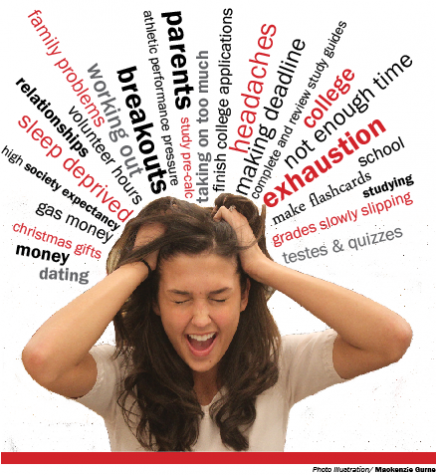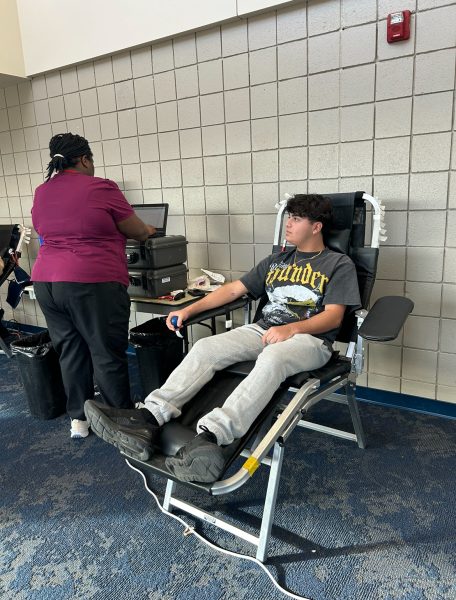Stress causes student chaos
Bulky backpacks bursting seams of thick material and stress levels exceeding their limits. It’s midterm season.
“School is hard for kids, you know; grades are really important,” health teacher Valerie Schneider said. “When you hear kids talk about academics and homework and jobs, you wonder how they prioritize themselves.”
Anxiety and the feeling of being overwhelmed triggers stress, according to AP psychology teacher Lisa Hallam. School is considered one of the top contributors of teenage stress.
School is a somewhat or significant source of stress to 83 percent of teenagers and 10 percent of teens express receiving lower grades than they are capable of earning because of stress, according to the American Psychology Association (APA) website.
American teenagers feel they experience stress in patterns similar to adults; and during the school year, they recorded stress levels even higher than those proclaimed by adults, according to the APA. The impact of stress on teens also affects their performance at home and work.
“Stress is bad for anybody,” Schneider said. “You don’t function well when you’re under stress. No one functions well under stress.”
Because of the amount of stress students handle, especially during midterms, their efforts may decline in other areas in their life.
“I start to overthink things and lose time management skills,” senior Bianca Koupparis said. “I always tell myself I should study and then I kind of push it off and get even more stressed out.”
An individual is affected by stress from head to toe. It impacts sleep, mood, posture, the respiratory system, cardiovascular system, nervous system and much more, according to the APA.
“The lack of sleep, I think it shocks me the most. People think that they can just study, study, study, study,” Hallam said. “You have to spread it out and you have to take breaks in between, otherwise your brain just doesn’t process it.”
But there are solutions to stress.
“It’s about changing your mindset,” she said. “It’s that glass-half-full, glass-half-empty thing; it’s a cognitive process of how you deal with that.”
Balancing material and studying in small chunks can relieve stress in the long run, according to English teacher Lisa Hubbard.
A physical approach also releases stress. Teens who engage in more physically active stress management behaviors, such as running or skateboarding, report lower stress levels and better health behaviors overall; especially when it comes to sleep, exercise and weight, according to the APA.
“I like to go to the gym when I’m stressed out and run or do legs workouts,” junior Nicolette Monacelli. “After, I feel relieved and my mind is cleared because I let all my stress and anger out while working out.”
Your donation will support the student journalists of Eisenhower High School. Your contribution will allow us to purchase equipment and cover our annual website hosting costs.











Tony • Jan 22, 2016 at 8:40 am
I usually go with knitting or sewing. It’s something nice and small to focus on, plus you can just keep it to a simple scarf or design. It’s easily portable and somewhat cheap, and if you finish your project you’re rewarding yourself with a cute scarf or something. It’s really relaxing once you get the hang of it.
There are also great tips and advice here. Feel free to check it out.
Thanks for the post guys. Great read here. Keep it coming.
Cheers!